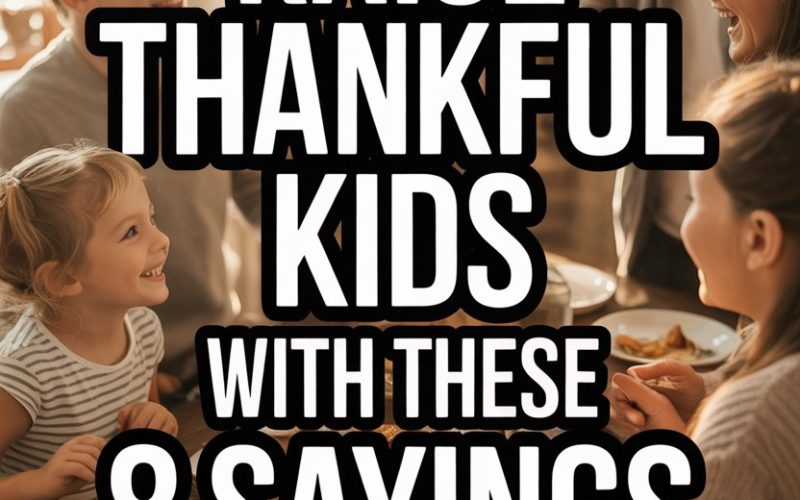Gratitude isn’t something kids pick up from osmosis or by staring at a motivational poster hanging in the hallway.
It’s a skill—one that’s taught, modeled, and yes, occasionally bribed out of a child who insists the “worst thing in the world” is having the green cup instead of the blue one.
If you’re keen on raising children who say “thanks” and actually mean it, a few clever sayings can quietly work their magic at the dinner table, in the car, or even mid-tantrum on the kitchen floor.
1. Thank You For…
Those classic three words—the bedrock of gratitude. Yet, “thank you” can be a bit empty unless we show our kids how to flesh it out.
Add the “for” and suddenly the abstract becomes specific: “Thank you for helping me find my shoes.” “Thank you for listening when I was upset.”
It’s the difference between tossing a coin in a fountain and actually making a wish.
Research from Harvard Medical School points out that children who practice more detailed gratitude tend to be more optimistic and generous.
So, next time your little one mutters a robotic “thanks,” prompt them with a gentle, “Thank you for…?” and watch their gears turn.
2. I Appreciate…
A tiny phrase, big payoff. Appreciation feels a bit grown-up, doesn’t it? And kids love anything that makes them feel a little older.
Swapping in “I appreciate” creates a more personal connection. “I appreciate you sharing your toys with your sister” means you’ve noticed, and it mattered.
Psychologists note that specific praise boosts self-esteem much more than blanket statements. Turns out, children who feel appreciated are more likely to notice good deeds around them and comment on them, too.
Suddenly the dinner table is filled not just with peas, but with tiny, grateful voices.
3. How Lucky Are We…
Nothing says “team spirit” like a family who counts their blessings together. “How lucky are we to have pancakes for breakfast?” works wonders, especially when followed by a sticky high-five.
This phrase helps children spot little joys—pancakes, a sunny day, a friend’s smile—and, with repetition, starts to rewire their brains for gratitude. I
t’s a favourite among psychologists because it turns abstract gratitude into a shared moment, a ritual you can pass around like the saltshaker.
And if you’re thinking, “My kids will just say we’re lucky because we have WiFi?” Well, fair enough. Sometimes you have to take what you can get.
4. I’m Grateful For…
If your family has ever attempted a “what are you thankful for” round at the table and it devolved into a competition over who loves dinosaurs more, you’re not alone.
The trick is the regular use of “I’m grateful for…” as a model.
Say it often: “I’m grateful for these muddy boots because they mean we had fun outside.” “I’m grateful for your giggles, even at bedtime.”
Kids mimic language, and the more comfortable you are sharing your own gratitude—even on tough days—the more likely your children will be to join in.
University of California studies found that families who regularly practiced gratitude rituals saw marked improvements in everyone’s resilience and happiness levels. That’s right—even parents.
5. That Was Kind Of You
Notice a moment of generosity? Shout it from the rooftops (or at least from across the lounge). “That was kind of you” does two things: it names the action and it labels it as generosity, not obligation.
Experts like psychologist Michele Borba suggest that kids develop empathy and gratitude more easily when they see kindness recognized and celebrated.
Whether your child held open a door, shared a biscuit, or used their “inside voice” for once, point it out. Don’t be surprised if you see those behaviours multiply like socks in the laundry.
6. What Was The Best Part Of Your Day
Gratitude doesn’t always come in big, shiny packages. Sometimes it’s in the tiny, silly details.
Asking your child “What was the best part of your day?” trains their focus on positive moments, even after a rough afternoon.
You might get wild answers (“Lunch was best because it was shaped like dinosaurs!”), but over time, kids learn to look for good things throughout the day, knowing you’ll ask. It’s like a scavenger hunt for silver linings.
Educators have long used this trick to boost emotional intelligence in classrooms; it works just as well in kitchens and backseats.
7. Share The Love
Encourage kids to use “Share the love!” when someone does something nice for them. It’s a nudge to spread good feelings around, and it helps kids see that gratitude isn’t a one-off—it’s contagious.
You’ll notice younger children picking up this phrase quicker than you can say “please don’t lick the window.” It’s a playful way to embed gratitude in daily routine, from playdates to car rides.
A study from the University of North Carolina found that children who actively share positive feelings have more friends and better emotional health. “Share the love” isn’t just cute; it’s practically medicinal.
8. Thank You For Teaching Me
Here’s one for the big kids and the grown-ups alike. “Thank you for teaching me” flips the script: you’re the learner, they’re the guide.
Whether your child has shown you how to play a new game or your partner demonstrated an advanced level of patience during bedtime chaos, this phrase makes gratitude a two-way street.
Children love the chance to teach. When they see you value their knowledge or patience, they’re more likely to notice and appreciate when others share time and wisdom with them.
And yes, it’s perfectly acceptable to thank your child for teaching you how to change Netflix profiles yet again.
When Gratitude Feels Like a Stretch
Gratitude isn’t always readily available, especially when the day’s been a parade of stubbed toes and sibling squabbles. That’s perfectly normal.
None of these sayings need to be forced or squeezed into moments that aren’t ready for them.
Start small. Pick one or two phrases that feel natural to your family, and sprinkle them in wherever you can.
Soon enough, they’ll pop up on their own—probably at an inopportune moment, like in the middle of the supermarket or when you’re running late for swimming lessons.
The trick isn’t perfection. It’s the gentle, steady reminder that there’s good stuff, even on the messiest days.
Growing More Thankful, One Phrase at a Time
Raising grateful children isn’t about pretending every moment is Instagram-worthy. It’s about teaching them to spot the good and say it out loud, even when the dog’s eaten someone’s science project.
With these eight sayings in your parenting toolkit, gratitude becomes part of the family’s everyday lingo.
And don’t be surprised when you overhear your little ones whispering “thank you for…” to the cat. That’s when you know it’s working.
And if you’re lucky, maybe—just maybe—someone will thank you for sharing your last biscuit. Stranger things have happened.




